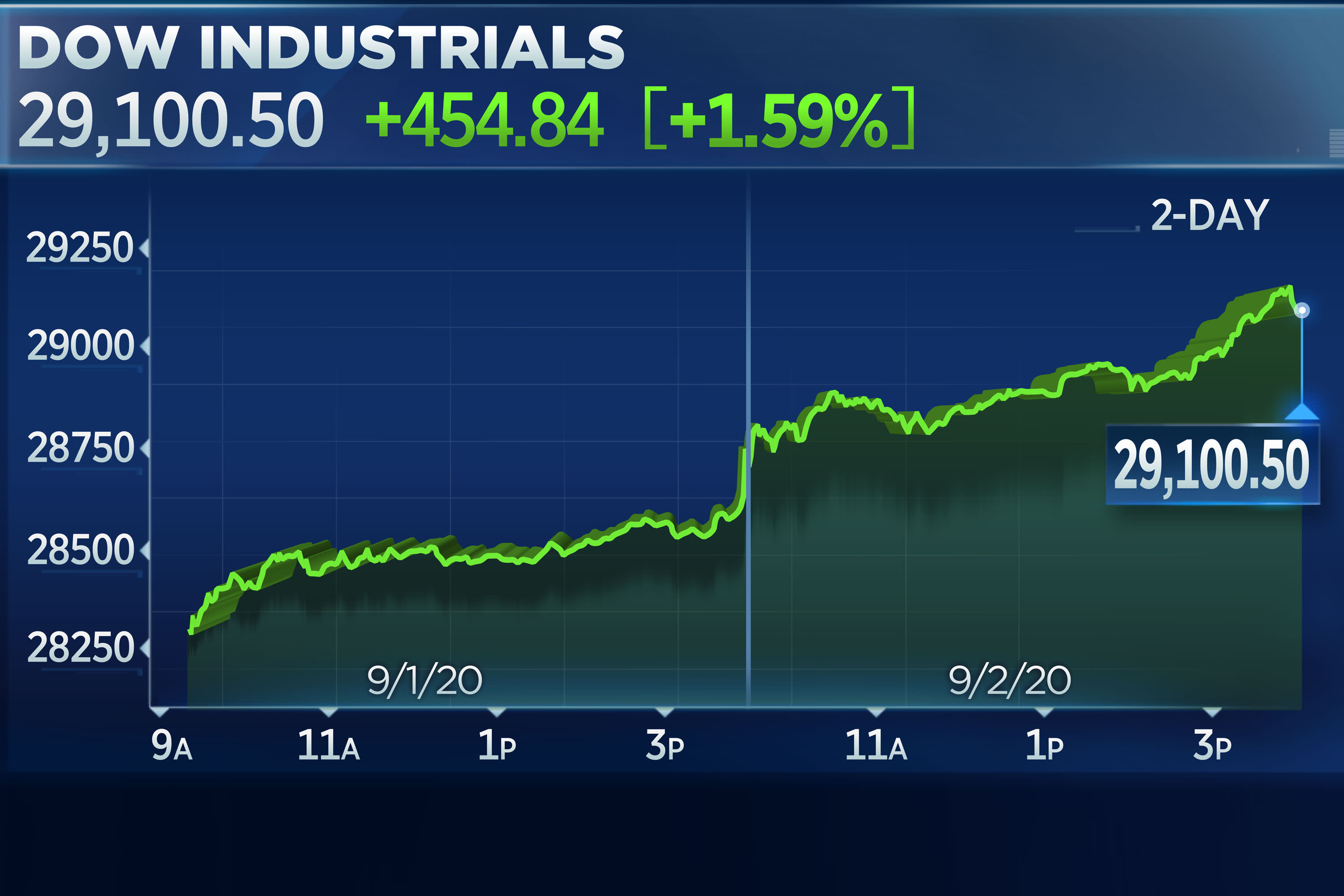
Stocks rose sharply on Wednesday, continuing a strong start to September for the market as traders took profits out of high-flying names like Apple and Tesla and snapped up shares in more beaten-down parts of the market.
The Dow Jones Industrial Average advanced 454.84 points, or 1.6%, to close at 29,100.50. It was the Dow’s first close above 29,000 since February. The S&P 500 gained 1.5% to end the day at 3,580.84 while the Nasdaq Composite was higher by 1% at 12,056.44.
Both the S&P 500 and Nasdaq hit record highs, with the Nasdaq topping 12,000 for the first time. The Dow also posted its biggest one-day move since July 14. The S&P 500 had its best day since July 6.
Coca-Cola rose more than 3% along with IBM and Dow Inc to lead the 30-stock average higher. However, those stocks are still down year to date. Apple and Tesla slid 2.1% and 5.8%, respectively, giving back some of their recent sharp gains. The iShares Russell 1000 Value ETF (IWD) rose 1.6% to outperform its Growth counterpart.
Mike Bailey, director of research at FBB Capital Partners, pointed out that semiconductor stocks were outperforming software names in another sign of a market rotation taking place. The iShares Expanded Tech-Software ETF (IGV) traded 0.5% higher while the VanEck Vectors Semiconductor ETF (SMH) popped more than 2%.
“We’re seeing buyers perhaps looking for a little bit more durable growth, but not wanting to pay the kinds of crazy tech valuations that are out there,” said Bailey.
Wall Street was coming off a banner session in which the S&P 500 logged its best first trading day of September since 2010, according to Bespoke Investment Group.
Morgan Stanley Chief U.S. Equity Strategist Mike Wilson said Tuesday on “Closing Bell” that he was still optimistic about the market long-term but that weakness in the weeks ahead was on the table after such a strong rally.
“I remain very constructive over the next 12 months,” Wilson said. “I think we’re a little bit overcooked … It’s impossible to try to time these types of corrections,” Wilson said. “It would not surprise me if we got a 10% correction, but it wouldn’t be surprising if we didn’t, either. We’re in a bull market.”
In Washington, congressional leaders appear to be far apart in negotiations for another relief package, but the Trump administration announced on Tuesday evening that the Centers for Disease Control and Prevention would invoke its authority to halt evictions through the end of the year.
The moves Wednesday also followed conflicting news in the fight against the coronavirus, with Swiss pharmaceutical firm Roche announcing that it would launch a new rapid antigen test in Europe by the end of the month. The company said it would apply for an emergency use authorization from the U.S. Food and Drug Administration.
However, an expert panel convened by the U.S. National Institute of Health said that a plasma treatment touted by President Trump and FDA head Stephen Hahn does not appear to be effective against Covid-19 based on current research.
In economic news, ADP said U.S. private payrolls grew by 428,000 in August. Economists polled by Dow Jones expected a gain of 1.17 million.
Peter Boockvar, chief investment officer at Bleakley Advisory Group, said the pace of hiring “has really slowed down over the past two months where the average is just 320k.”
“This print makes Friday’s BLS report really interesting because not only was the private sector BLS July print 1.46 million but the August estimate is 1.29 million, well different and well above than what ADP has said,” added Boockvar.
Correction: This story has been updated to reflect the S&P 500 closed at a record on Tuesday. A previous version of this story incorrectly stated the Dow closed at an all-time high.




